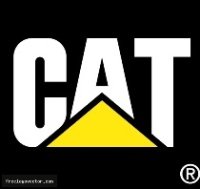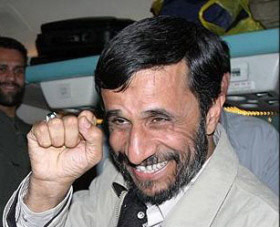March 2, 2010, - 12:27 pm
Caterpillar Does the Right Thing on Iran (Finally); When Will Shell?
As I’ve noted over the years, U.S. companies get around our embargoes and boycotts of nations like Iran (and, previously, Iraq and Libya) by trading through foreign subsidiaries. Prior to becoming Vice President, when Dick Cheney was Chairman of Halliburton, the company got around our embargo on Libya, using a foreign subsidiary. Using its subsidiary, KBR (then known as “Brown and Root”), Halliburton built underground steel tunnels, which allowed Libya to move vehicles and weaponry underground, impervious to our satellite views.


And, since then, many U.S. companies like General Electric and Caterpillar, have been doing business with Iran through their foreign arms. As I’ve noted, even Coke and Pepsi sell to Iran through their Irish subsidiaries. It emasculates our sanctions and severely hampers our efforts at foreign policy sticks with regard to Iran and other such human rights violators and Islamic nuclear proliferaters.
But now, at least, Caterpillar–under pressure from a lobbying group, United Against Nuclear Iran–is doing the right thing, and has announced it will no longer sell its heavy equipment to Iran though its European subsidiary and its Iranian distributor, Arya Machinery. Caterpillar has also done the right thing by refusing to bow to Palestinian Muslim pressure to stop selling equipment to Israel. And for doing the right thing in two instances–especially when this tough economy includes shrinking sales for Caterpillar, anyway–the company should be applauded. GE’s board, too, voted to stop new business in the country in 2005.
More:
Caterpillar Inc. has prohibited its non-U.S. subsidiaries from accepting orders known to be headed to Iran, the heavy-equipment manufacturer said in a letter to a lobbyist group.
Caterpillar, of Peoria, Ill., has acknowledged in the past that its equipment is sold in Iran despite U.S. sanctions that prohibit most American exports to the Islamic Republic. The company has said its foreign subsidiaries have conducted limited sales to independent dealers outside Iran, which resell to customers inside the country. Caterpillar has said those sales have been in full compliance with U.S. export regulations.
As recently as late last year, closely held Arya Machinery, with offices in Tehran, marketed itself on its Web site as Iran’s exclusive dealer of Caterpillar equipment. A senior sales executive at the company told The Wall Street Journal in October that Arya buys equipment from a Caterpillar subsidiary in Europe.
While it may be legal, it has become increasingly difficult for many multinationals to shoulder the public-relations burden that has come with even limited business with Iran. German engineering conglomerate Siemens AG in late January said it would wind down its Iranian business and not accept any more orders from the country. . . .
The lobby group that claimed credit for Caterpillar’s reversal, United Against Nuclear Iran, has turned up the heat recently on U.S. and European companies. The group is led by a number of former Democratic and Republican national-security officials, including R. James Woolsey, former director of the Central Intelligence Agency under President Bill Clinton. UANI President Mark Wallace was a deputy campaign manager for former President George W. Bush in 2004 and then served as an ambassador-level diplomat to the U.N during the Bush administration. . . .
“We applaud Caterpillar’s decision to prohibit its non-U.S. subsidiaries from doing business in Iran,” Mr. Wallace said in a press release over the weekend announcing the decision. “All responsible companies that transact business in Iran through the veil of a foreign subsidiary should take this as a wakeup call.”
In a letter to Mr. Wallace, dated Feb. 25 and released by UANI, Caterpillar Chairman and Chief Executive James Owens defended the company’s past practices. He said Caterpillar’s indirect business with Iranian buyers amounts to less than two-tenths of one percent of 2009 world-wide sales. . . .
In an emailed statement Monday, a Caterpillar spokesman said the company “now has gone a step further by prohibiting its non-U.S. subsidiaries from accepting any orders for Caterpillar machines, engines and new parts where the subsidiary knows that the product would be shipped to Iran.”
UANI also has targeted Royal Dutch Shell PLC. The Anglo-Dutch oil giant has only a small presence in Iran: it operates a lubricants-marketing business and acts as an adviser to China Petroleum & Chemical Corp., or Sinopec, on the big Yadavaran oil project. Also, in 2008 it entered into a service contract to develop the South Pars fields, part of a huge liquefied-natural-gas project called Persian LNG in the northern Gulf. Shell, which says it hasn’t reached a final decision on whether to proceed with the project until all the commercial and engineering work is complete, declined to comment on whether it would follow Caterpillar in divesting from Iran.
Unfortunately, even though Caterpillar and GE aren’t doing business with Iran anymore, far too many U.S. companies are. And not just through their U.S. subsidiaries. As I’ve noted in the past, the U.S. allows for “emergency” goods to be sold and shipped to Iran, but in most cases, it’s hardly the stuff of emergencies. Since Bill Clinton reduced that amount to $8 million in goods, the Bush Administration upped the amount to nearly $150 million in goods, and it continues to grow. Companies–including Pepsi, Coke (both of which also sell to Iran under this provision and not just via their Irish arms), and even bra manufacturers–continue to, legally, do biz with Iran. The shipments even include arms and weapons from the U.S. to Iran. Not kidding.
We wouldn’t want those Iranian women to sag, right? That’s an “emergency.” Ditto for having a Coke and an Ahmadinejad Smile. And why let them fight us, without providing the ammunition . . . just to make it fair.
Tags: Ahmadinejad, Arya Machinery, Caterpillar, embargo, embargoes, Europe, European subsidiaries, foreign subsidiaries, General Electric, Iran, James Woolsey, Jim Woolsey, Mark Wallace, Royal Dutch Shell PLC, sanctions, Shell, UANI, United Against Nuclear Iran


I imagine they’ll just begin getting a bunch of new orders for heavy earth moving equipment from Dubai. That will somehow end up in Iran. Of course this will mean Iran will have to spend more money to get the same equipment.
Daniel on March 2, 2010 at 12:56 pm